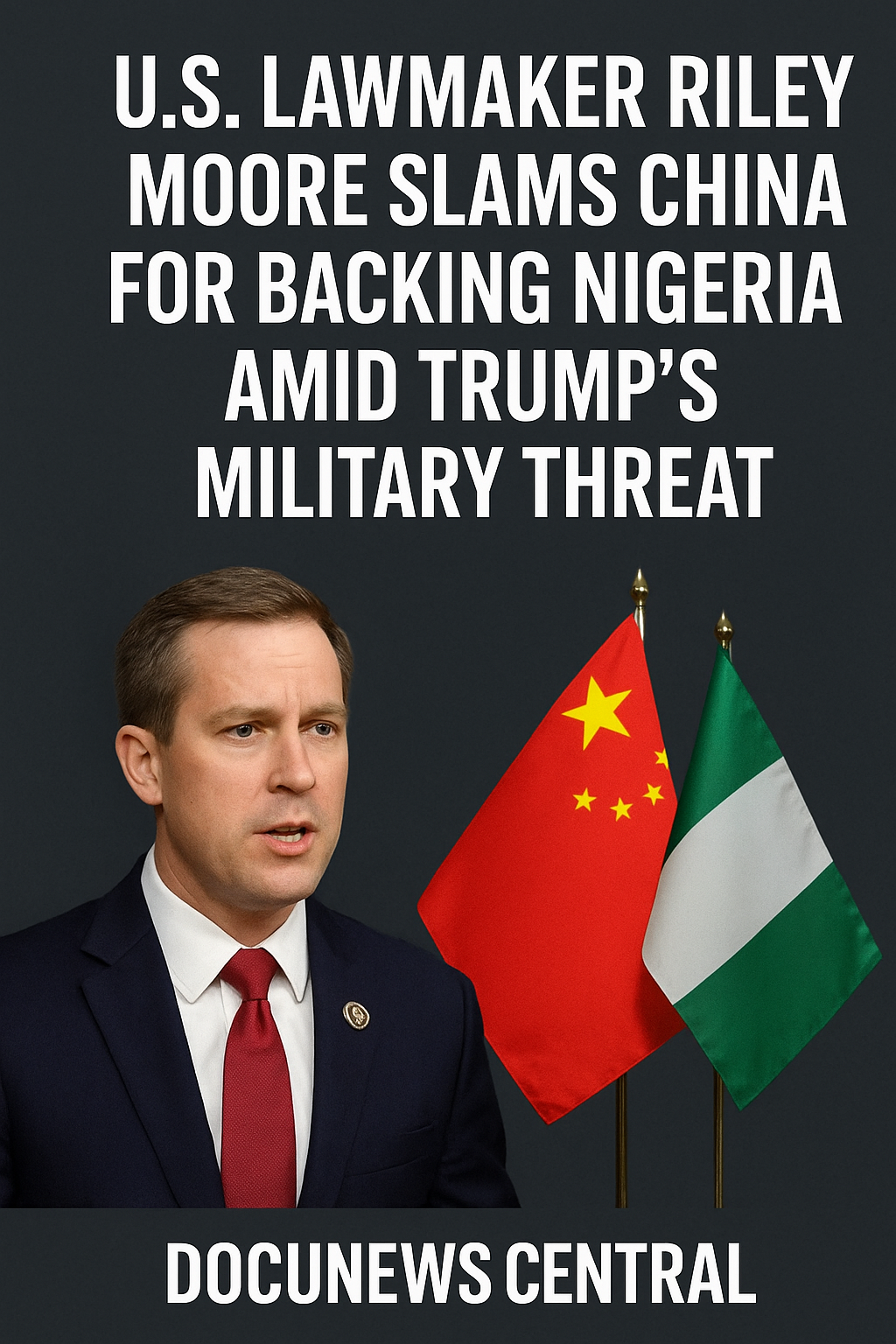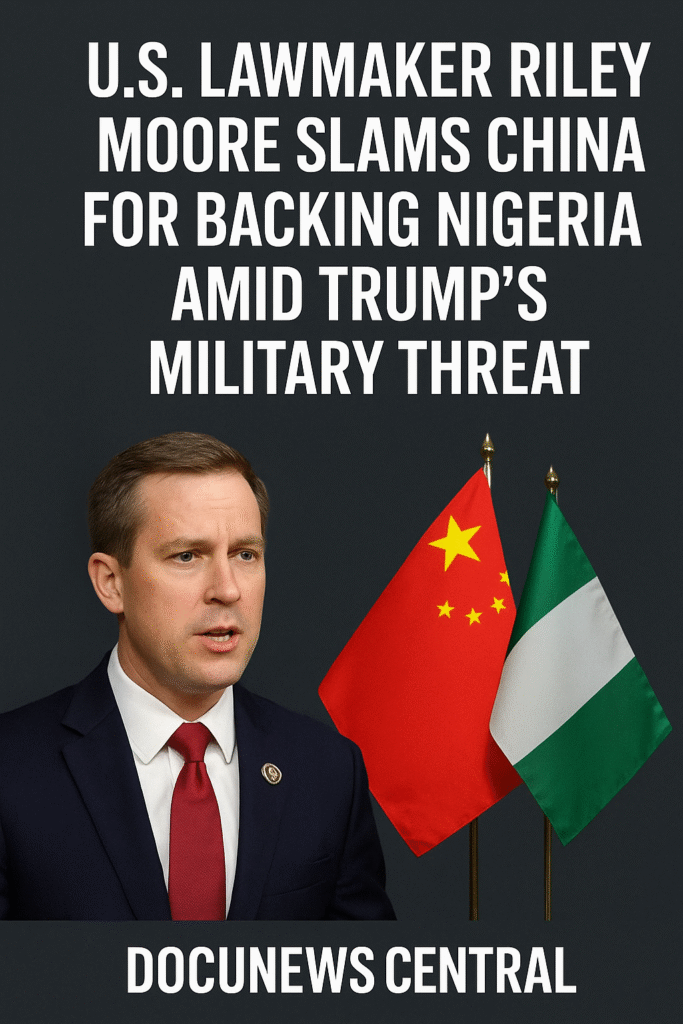

Riley Moore Slams China for Backing Nigeria — Global Tensions Rise After Trump’s Military Threat

In a major international escalation, U.S. Representative Riley Moore has strongly criticized China for backing Nigeria. His reaction came after former President Donald J. Trump warned of possible U.S. military action over alleged persecution of Christians in Nigeria.
This mix of religion, human rights, and politics highlights how faith and power now influence each other on a global scale. As tension grows, Nigeria stands between two major powers — the United States and China — while facing deep internal security problems.
How the Dispute Began
The crisis started after Trump, through his social-media platform, told the U.S. Defense Department to prepare for “possible action” in Nigeria. He accused Nigeria’s government of allowing the killing of Christians and threatened that the U.S. “may very well go into that now-disgraced country, guns blazing, to stop the terrorists.”
China quickly replied. Its Foreign Ministry described Nigeria as a “comprehensive strategic partner” and said no country should interfere in Nigeria’s internal matters under the excuse of religion or human rights. This response drew harsh words from Riley Moore, who pointed to China’s own record on religion and minority rights.
Why the Christian Issue Matters
The debate centers on claims of a “genocide of Christians” in Nigeria — a term used by both Trump and Moore. Christian communities in central and northern parts of Nigeria have long faced attacks, kidnappings, and violence. The big question remains: are these attacks organized, and what should the world do about them?
To Moore and his allies, protecting Nigeria’s Christians is both a moral duty and a test of faith. They argue that the U.S. should act when religious groups are under threat. China, on the other hand, supports Nigeria’s right to handle its own affairs without outside pressure.
China’s Support: Why It Angers the U.S.
Moore’s criticism of China focuses on three main points:
- Moral claim: He says China cannot lecture others about human rights while facing accusations of persecuting Christians and minorities at home.
- National sovereignty: He believes the U.S. must be free to defend persecuted groups without approval from Beijing or any foreign power.
- Global rivalry: Moore views this as part of the wider power struggle between Washington and Beijing, with Nigeria caught in the middle.
Possible U.S. Military Action
The idea of American troops entering Nigeria may sound extreme, but it raises serious questions:
- Complex reality: Nigeria is large, diverse, and already facing insurgency and community clashes. Any U.S. intervention would be costly and risky.
- International law: Intervening under “human rights” reasons is controversial. China calls it interference in another nation’s affairs.
- Religious effect: Western involvement could worsen religious divides if seen as a Christian-backed operation.
- Power politics: China’s support may increase its influence in Africa while challenging the U.S.’s global reach.
China’s Message to the World
By defending Nigeria, China repeats its long-held stance: respect for sovereignty and non-interference. It also sends a signal that the U.S. should not act as the world’s moral police. Supporting Nigeria gives Beijing diplomatic leverage and strengthens its influence in Africa.
Nigeria gains political support from China but also risks deeper involvement in a global rivalry between two superpowers.
Riley Moore’s Pushback
Riley Moore has built his reputation by mixing faith-based advocacy with strong foreign-policy opinions. He supports Trump’s call to defend persecuted Christians. He also questions China’s moral credibility and urges the U.S. to use its power to protect religious freedom abroad.
This combination of faith and foreign policy reflects a new pattern in Washington, where moral arguments are used to shape global strategies.
Nigeria’s Dilemma
For Nigeria, this standoff brings both opportunity and risk.
Opportunity:
- International attention may force Nigeria to act on insecurity and protect vulnerable groups.
- Global focus can attract humanitarian aid and security support.
Risk:
- Threats of U.S. sanctions or intervention may scare investors and harm Nigeria’s image.
- Being part of a U.S.–China power contest could distract the government from solving domestic issues.
- If Nigeria appears defiant, it may lose support from Western allies.
The Bigger Picture
This dispute goes beyond Nigeria. It shows three major global trends:
- Faith and foreign policy: The U.S. now links religious freedom with international action.
- New battleground: Africa has become a key area of U.S.–China competition.
- Sovereignty debate: China’s defense of non-interference challenges the idea of humanitarian intervention.
- Soft power: Both powers use faith and moral claims to influence public opinion worldwide.
Long-Term Impact of Moore’s Remarks
According to Reuters, U.S.–China competition in Africa continues to grow. In that context, Riley Moore’s comments are not only about Nigeria but also about the global fight for influence and moral leadership.
What to Watch Next
- Nigeria’s response: Will the government address the Christian persecution claims directly?
- China’s next steps: Will it increase investments or public support for Nigeria?
- U.S. follow-up: Will Washington move from words to action — through aid cuts or sanctions?
- Ground reports: Independent checks on alleged killings will be crucial.
- African reactions: Other nations may soon decide whether to align with China’s or America’s approach.
Internal Links to Explore Further
- Insecurity in Nigeria: Causes and Global Reactions
- How Religion and Politics Intersect in Nigeria’s Security Crisis
- China Backs Nigeria Against Trump’s Military Invasion Threat
Final Thoughts
The clash between the U.S., China, and Nigeria is more than a political disagreement. It reveals how global power, religion, and human rights now overlap in world affairs. For the U.S., Riley Moore and Trump’s message is clear: protect persecuted Christians and confront nations that look away. For Nigeria, this is a test of leadership and diplomacy. For China, it is a chance to prove its loyalty to African partners while challenging U.S. influence.
In the end, the Riley Moore–China–Nigeria–Trump military threat story shows how faith, freedom, and power continue to shape the modern world.






